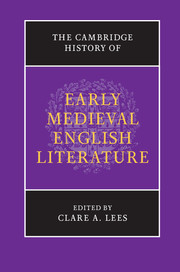Book contents
- Frontmatter
- Contents
- List of Illustrations
- List of Contributors
- Acknowledgements
- List of Abbreviations
- Introduction: literature in Britain and Ireland to 1150
- I WORD, SCRIPT AND IMAGE
- II EARLY ENGLISH LITERATURE
- 7 Across borders: Anglo-Saxon England and the Germanic world
- 8 English literature in the ninth century
- 9 The writing of history in the early Middle Ages: the Anglo-Saxon Chronicle in context
- 10 The literary languages of Old English: words, styles, voices
- 11 Old English poetic form: genre, style, prosody
- 12 Beowulf: a poem in our time
- 13 Old English lyrics: a poetics of experience
- 14 Literature in pieces: female sanctity and the relics of early women’s writing
- 15 Saintly lives: friendship, kinship, gender and sexuality
- 16 Sacred history and Old English religious poetry
- 17 Performing Christianity: liturgical and devotional writing
- 18 Riddles, wonder and responsiveness in Anglo-Saxon literature
- III LATIN LEARNING AND THE LITERARY VERNACULARS
- Bibliography
- Index of manuscripts
- Index
10 - The literary languages of Old English: words, styles, voices
from II - EARLY ENGLISH LITERATURE
Published online by Cambridge University Press: 05 February 2013
- Frontmatter
- Contents
- List of Illustrations
- List of Contributors
- Acknowledgements
- List of Abbreviations
- Introduction: literature in Britain and Ireland to 1150
- I WORD, SCRIPT AND IMAGE
- II EARLY ENGLISH LITERATURE
- 7 Across borders: Anglo-Saxon England and the Germanic world
- 8 English literature in the ninth century
- 9 The writing of history in the early Middle Ages: the Anglo-Saxon Chronicle in context
- 10 The literary languages of Old English: words, styles, voices
- 11 Old English poetic form: genre, style, prosody
- 12 Beowulf: a poem in our time
- 13 Old English lyrics: a poetics of experience
- 14 Literature in pieces: female sanctity and the relics of early women’s writing
- 15 Saintly lives: friendship, kinship, gender and sexuality
- 16 Sacred history and Old English religious poetry
- 17 Performing Christianity: liturgical and devotional writing
- 18 Riddles, wonder and responsiveness in Anglo-Saxon literature
- III LATIN LEARNING AND THE LITERARY VERNACULARS
- Bibliography
- Index of manuscripts
- Index
Summary
Neque enim possunt carmina, quamuis optime conposita, ex alia in aliam linguam at uerbum sine detrimento sui decoris ac dignitatis transferri.
HE, iv. 24For it is not possible to translate verse, however well composed, literally from one language to another without some loss of beauty and dignity.
Along with the Alfredian aphorism ‘hwilum word be worde, hwilum andgit of andgiete’ [sometimes word for word, sometimes sense for sense] and Ælfric’s comments in the preface to his translation of Genesis, the passage from Bede’s Historia ecclesiastica gentis Anglorum quoted above is one of the most well-known Anglo-Saxon meditations on the problems and possibilities of translation. What is remarkable about Bede’s phrase is not the concern for the integrity of words that it expresses, but the respect it bestows on the vernacular language. Although he advocated translating certain Christian works such as the Pater Noster from Latin into Old English, and according to Cuthbert was working on his own translation of the Gospel of St John at his deathbed, in the Historia ecclesiastica, even though he took the trouble to list them, Bede gave the vernacular languages of early medieval Britain and Ireland short shrift. Here, however, he indicates that the language we now know as Old English might be capable of great artistry and power. Bede also makes a wider point, which isn’t actually about translation at all but about how languages function. The loss of ‘decoris ac dignitatis’ feared by Bede is due to the different ways in which Latin and Old English function as systems of signification. ‘Words’, as Jeremy Smith has put it, ‘are defined by their relationship with other words.’ The words of a particular language are defined by their context, discourse and delivery. They play off one another to define one another’s semantic fields and create meanings. And, as Bede recognized, these meanings are always in process rather than fixed and stable. Bede’s concern for the manner in which words generate meanings marks one of the major subjects of this chapter.
- Type
- Chapter
- Information
- The Cambridge History of Early Medieval English Literature , pp. 257 - 277Publisher: Cambridge University PressPrint publication year: 2012
- 1
- Cited by



